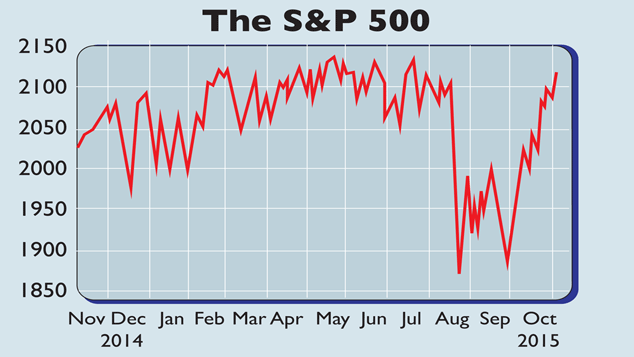A strong recovery in stocks
October is often a bad month for markets, but for pan-European stocks, which gained 8.3%, it proved the best month since July 2009.

Get the latest financial news, insights and expert analysis from our award-winning MoneyWeek team, to help you understand what really matters when it comes to your finances.
You are now subscribed
Your newsletter sign-up was successful
Want to add more newsletters?

Twice daily
MoneyWeek
Get the latest financial news, insights and expert analysis from our award-winning MoneyWeek team, to help you understand what really matters when it comes to your finances.

Four times a week
Look After My Bills
Sign up to our free money-saving newsletter, filled with the latest news and expert advice to help you find the best tips and deals for managing your bills. Start saving today!

After a torrid summer, equities have made a rapid recovery. October is often a bad month for markets, but for pan-European stocks, which gained 8.3%, it proved the best month since July 2009. American stocks had their best month in four years, clawing back the ground lost in the summer, while the FTSE 100 gained almost 5%, its best month since July 2013.
What the commentators said
As the jitters have subsided, emerging markets and commodities that partly depend on the Middle Kingdom have recovered too. But the bigger theme here is that several central banks have either announced or hinted at yet more monetary loosening, noted FT.com, and liquidity always bodes well for stocks.
European Central Bank President Mario Draghi has struck a dovish tone of late; the Bank could step up its quantitative easing (QE), or money-printing, programme, as soon as December. Sweden's central bank has just boosted its QE programme. And the US Federal Reserve has put off a first interest-rate rise in almost a decade amid global turbulence and weaker US data.
MoneyWeek
Subscribe to MoneyWeek today and get your first six magazine issues absolutely FREE

Sign up to Money Morning
Don't miss the latest investment and personal finances news, market analysis, plus money-saving tips with our free twice-daily newsletter
Don't miss the latest investment and personal finances news, market analysis, plus money-saving tips with our free twice-daily newsletter
Beyond easy money, there is certainly little to be bullish about, said Buttonwood in The Economist. Global growth has eased, making it more difficult for American firms to keep up their solid profit increases of recent years. Third-quarter sales and earnings are expected to be 3% and 4% lower respectively once all the companies in the S&P 500 have reported. Europe is looking pretty lacklustre too. Third-quarter earnings there are set to be 5.4% down on the year.
For the past six years, "we have had a repeating cycle", said Authers. The US economy has been strong enough to keep growing, but weak enough to need more easy money. Now this "Goldilocks on ice" scenario appears to apply to the rest of the world. The even bigger picture is that central-bank action continues to make up for shaky fundamentals, a pattern we have seen far too often in the past 15 years.
Get the latest financial news, insights and expert analysis from our award-winning MoneyWeek team, to help you understand what really matters when it comes to your finances.

-
 Should you buy an active ETF?
Should you buy an active ETF?ETFs are often mischaracterised as passive products, but they can be a convenient way to add active management to your portfolio
-
 Power up your pension before 5 April – easy ways to save before the tax year end
Power up your pension before 5 April – easy ways to save before the tax year endWith the end of the tax year looming, pension savers currently have a window to review and maximise what’s going into their retirement funds – we look at how